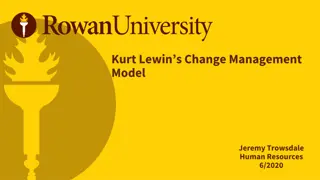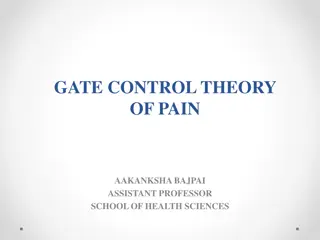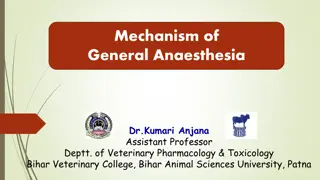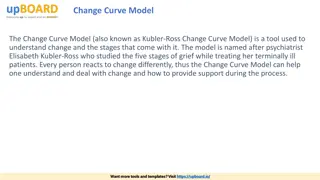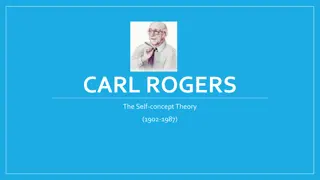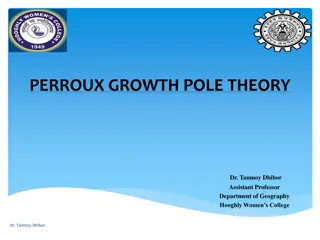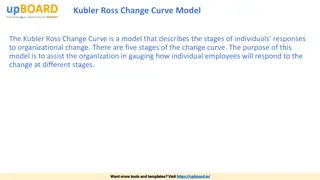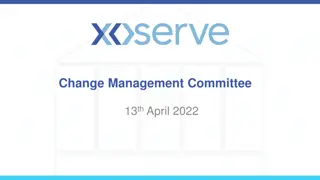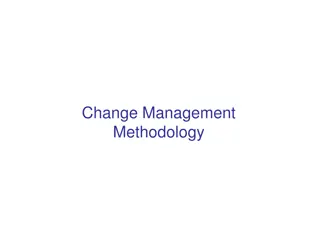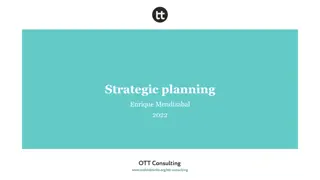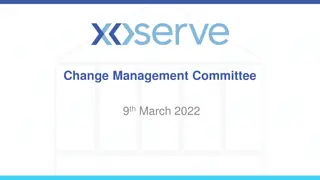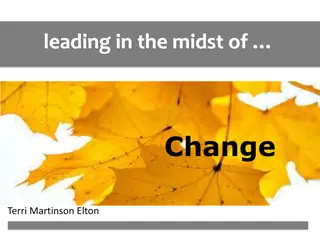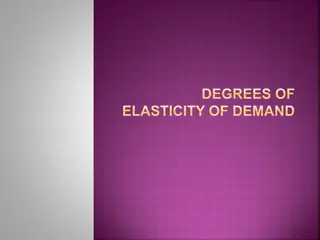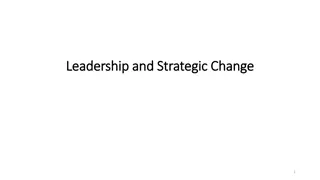Ginzburg Landau phenomenological Theory
The Ginzburg-Landau phenomenological theory explains superconductivity and superfluidity as distinct thermodynamic phases. It focuses on phase transitions characterized by singularities in specific heat at the transition temperature. Derived from BCS theory, it quantifies condensation energy, emphas
1 views • 38 slides
Crystal Field Theory in Transition Metal Complexes
Crystal Field Theory (CFT) explains the colors and magnetic properties of transition metal complexes. It focuses on the energy changes in d-orbitals of metal ions caused by surrounding ligands. This theory, developed in 1929, provides insights into the bonding interactions in complex compounds. The
10 views • 44 slides
Understanding Social Learning Theory and the Power of Example
Social Learning Theory, introduced by Bandura, emphasizes learning through observation and modeling. It explores how individuals acquire behavioral dispositions, trial-and-error experiences, and the impact of stimuli in the environment. The theory focuses on the importance of attention, retention, a
1 views • 17 slides
Evolution of Mathematical Theories and Proof Systems
Development of mathematical theories such as model theory, proof theory, set theory, recursion theory, and computational complexity is discussed, starting from historical perspectives with Dedekind and Peano to Godel's theorems, recursion theory's golden age in the 1930s, and advancements in proof t
1 views • 29 slides
Introduction to Organizational Behavior: Management Theories and Practices
Explore the evolution of organizational behavior from early management theories to contemporary practices. Understand the historical foundations and relevance of management theory in shaping workplace dynamics. Delve into key concepts like Scientific Management, Administrative Management, Bureaucrat
1 views • 28 slides
Understanding Kurt Lewin's Change Management Model
Explore Kurt Lewin's Change Management Model, its key components, implementation strategies, and the factors that contribute to the success or failure of change initiatives. Learn about Kurt Lewin's background, Lewin's Golden Rules for Change, common barriers to change, and the essential factors tha
1 views • 50 slides
Theories on the Origin of State: Divine, Force, Patriarchal, and More
Various theories such as Divine Origin, Force Theory, Patriarchal Theory, and others explain the origin of the state. Divine theories attribute state creation to God, while Force Theory emphasizes the strong subjugating the weak to establish authority. Each theory offers unique perspectives on the h
1 views • 24 slides
Understanding Forgetting: Theories and Influence on Memory Recall
Forgetting is a complex phenomenon influenced by theories such as Decay Theory, Interference Theory, and Motivated Forgetting. The Ebbinghaus forgetting curve highlights how memories fade over time. Decay Theory suggests memories decay over time, while Interference Theory explains how old and new me
0 views • 25 slides
Psychological Theories of Criminality: Understanding the Roots
Psychological theories of criminality delve into the association between intelligence, personality, learning, and criminal behavior. Major theories include Psychodynamic Theory by Freud, Behavioral Theory by Bandura, and Cognitive Theory by Kohlberg. These theories explore how unconscious mental pro
1 views • 20 slides
Austin's Theory of Law by Rinkey Sharma: An Overview
Austin's Theory of Law, presented by Rinkey Sharma, delves into the Imperative Theory of Law as proposed by Austin, known as the father of English jurisprudence. It explores General and Particular Jurisprudence, Austin's definition of law, and the elements of positive law, emphasizing the concepts o
0 views • 11 slides
Theories of International Relations Overview
The field of International Relations (IR) encompasses various theories that seek to explain global phenomena, drawing from disciplines like history, philosophy, and economics. Theory, derived from contemplation and speculation, organizes ideas to explain issues such as state emergence, conflict caus
1 views • 47 slides
Understanding the Gate Control Theory of Pain in Pain Management
This detailed content delves into the Gate Control Theory of Pain, explaining pain pathways involving nociceptors, A-delta fibers, and C fibers. It further explores central pain pathways like the spinothalamic tract, spinomesencephalic tract, and spinoreticular tract. The theory's mechanism of pain
3 views • 11 slides
Overview of Cooperative Game Theory and Bargaining Solutions
Cooperative game theory explores situations where players have mutual benefits in cooperating. The focus is on bargaining solutions to reach agreements despite conflicting interests. Key concepts include Nash Bargaining Solution, Kalai-Smorodinsky Bargaining Solution, and Rubinstein Bargaining Proce
1 views • 24 slides
Understanding the Theory of Firms: Neoclassical vs. Modern Approaches
The theory of firms is explored through the Neoclassical and Modern perspectives. Neoclassical theory focuses on profit maximization, while Modern theory delves into managerial, principal-agent, and transaction cost theories. The discussion covers criticisms of Neoclassical theory and the essential
1 views • 79 slides
Mechanism of General Anaesthesia Theories: Lipid Solubility, Surface Tension, Microcrystal, Protein Binding
Mechanism of general anaesthesia involves theories focusing on the interaction of anaesthetics with cell membrane components like lipids and proteins. The Lipid Solubility theory emphasizes the importance of an anaesthetic's affinity and solubility in nerve cell membranes, while the Surface Tension
1 views • 10 slides
Understanding the Change Curve Model: A Tool for Managing Change
The Change Curve Model, developed by Elisabeth Kubler-Ross, helps individuals navigate the stages of change by addressing denial, anger, bargaining, depression, and acceptance. This model provides a framework to understand different reactions to change and offers strategies to support individuals th
0 views • 4 slides
Theories of Causation in Psychological and Social Sciences
Overview of theories of causation categorized into psychological, social psychological, and sociological perspectives. Psychological theories focus on instinctive, biological, and psychological qualities of abusers, including Attachment Theory, Psychodynamic Theory, Social Learning Theory, and Situa
0 views • 15 slides
Carl Rogers and the Self-Concept Theory
Carl Rogers, a prominent figure in personality theory, emphasized individuals' constructive potential and the impact of their subjective experiences on personality development. He viewed individuals as goal-directed and capable of change, with the environment playing a facilitating or inhibiting rol
1 views • 78 slides
Understanding Political Theory through a Contextual Approach
Exploring G.H. Sabine's perspective on political theory through a contextual approach, emphasizing the importance of historical context and societal influences. Sabine argues that while political theory evolves with its contemporary politics, it should be analyzed within its specific time and social
0 views • 9 slides
Understanding Perroux Growth Pole Theory by Dr. Tanmoy Dhibor
The Perroux Growth Pole Theory, developed by French economist Francis Perroux in 1955, focuses on economic development and structural change. Dr. Tanmoy Dhibor discusses how modern economic growth differs from traditional equilibrium concepts, emphasizing growth towards specific locations. The theor
0 views • 15 slides
Evolution of Light Theory: From Wave Theory to Quantum Theory
At the turn of the century, the discovery of the photoelectric effect challenged the wave theory of light, leading to the development of the quantum theory by Max Planck and Albert Einstein. This new theory introduced the concept of discrete energy units known as quanta, bridging the gap between wav
1 views • 62 slides
Understanding Kubler Ross Change Curve Model for Organizational Change
The Kubler Ross Change Curve Model delineates five stages - Decision, Denial, Frustration, Depression, and Experiment - illustrating individual responses to organizational change. Recognizing these stages aids organizations in anticipating and managing employee reactions effectively. Each phase invo
0 views • 4 slides
Dp-branes, NS5-branes, U-duality, and M-Theory Overview
Overview of Dp-branes, NS5-branes, and U-duality derived from nonabelian (2,0) theory with Lie 3-algebra. Introduction to M-theory, including M2-branes and M5-branes in the strong coupling limit. Discussion on BLG theory, Lorentzian Lie 3-algebra, and the ABJM theory for M2-branes.
1 views • 32 slides
Understanding Time-Independent Perturbation Theory in Quantum Mechanics
Perturbation theory is a powerful tool in solving complex physical and mathematical problems approximately by adjusting solutions from a related problem with known solutions. This theory allows for more accurate approximate solutions by treating the difference as a small perturbation. An example inv
0 views • 19 slides
Ethical Theories: Divine Command vs. Virtue Theory Explained
Divine Command Theory asserts that morality is derived from God's commands, contrasting with Virtue Theory which focuses on developing moral virtues to achieve human flourishing and excellence. Divine Command Theory relies on religious texts, while Virtue Theory emphasizes the cultivation of virtues
0 views • 24 slides
Understanding Fermi Liquid Theory in Interacting Fermion Systems
Fermi liquid theory, also known as Landau-Fermi liquid theory, is a theoretical model that describes the normal state of metals at low temperatures. Introduced by Landau and further developed by Abrikosov and Khalatnikov, this theory explains the similarities and differences between interacting ferm
0 views • 23 slides
Change Management Committee Meeting Insights
Delve into the details of the Change Management Committee Meeting held on April 13, 2022. Explore topics such as change budgeting, horizon planning, budget vs. spend analysis, change pipeline, and development and delivery pipeline. Get an overview of the 2021-2022 DSC change and MiR pipeline, as wel
0 views • 55 slides
Computational Learning Theory: An Overview
Computational Learning Theory explores inductive learning algorithms that generate hypotheses from training sets, emphasizing the uncertainty of generalization. The theory introduces probabilities to measure correctness and certainty, addressing challenges in learning hidden concepts. Through exampl
0 views • 43 slides
Automata Theory and Theory of Computation Overview
This course overview covers concepts in automata theory and theory of computation, including formal language classes, grammars, recognizers, theorems in automata theory, decidability, and intractability of computational problems. The Chomsky hierarchy, interplay between computing components, modern-
0 views • 42 slides
Effective Change Management Methodology Toolkit
This methodology toolkit provides practical strategies for sponsors and change agents to identify and overcome natural barriers to change initiatives within their organizations. It outlines a structured approach divided into typical change route stages, field theory concepts, elements, phases, and p
0 views • 63 slides
Theories and Strategies for Effective Policy Change
Explore the intricacies of strategic planning, outcome mapping, change theories, policy windows, and more in the realm of policy entrepreneurship and advocacy. Learn about key concepts such as large leaps theory, policy streams theory, and how think tanks can influence policy decision-making process
0 views • 43 slides
Theories of Interest in Microeconomics II
Explore various theories of interest in economics, including the Classical Theory, Liquidity Preference Theory by Keynes, Productivity Theory, Abstinence Theory, Time-Preference Theory, Fisher's Time Preference Theory, and the Loanable Fund Theory. These theories offer different perspectives on the
0 views • 6 slides
Exploring the Evolution of Atomic Theory
Delve into the historical journey of atomic theory starting from Democritus and Aristotle's views to modern advancements proving some aspects of Dalton's theory incorrect. Learn about key laws and theories such as the Particle Theory of Matter, Dalton's Atomic Theory, and JJ Thomson's discoveries, s
0 views • 30 slides
Building Change Competency: Keys to Successful Change Management
Discover the importance of building change competency and the keys to successful change management. Explore why change competency is crucial for organizational success, along with strategies for managing change effectively. Learn about different change management approaches and the benefits of a pro
0 views • 25 slides
Change Management Committee Meeting Overview
The Change Management Committee Meeting on 9th March 2022 discussed the DSC Change Budget, Horizon Planning, Budget vs. Committed Spend, Change Pipeline, and Change Development & Delivery Pipeline, with insights on budget allocation and project progress. New Change Proposals like XRN5482 for meter a
0 views • 61 slides
Navigating Change: Strategies for Leading in Dynamic Environments
Explore different views of change, strategic approaches, and the importance of tending to both the process and decision-making aspects of change. Discover the significance of change theory and types of change, from continuous to paradigm shifts, in organizational leadership. Delve into the concepts
0 views • 40 slides
Understanding Degrees of Elasticity of Demand
Elasticity of demand refers to the responsiveness of quantity demanded to changes in price. Perfectly elastic demand occurs when there is an infinite demand at a particular price and demand becomes zero with a slight rise in price. Conversely, perfectly inelastic demand occurs when there is no chang
0 views • 11 slides
Understanding Motivation and Change in Fall 2013
Delve into the various aspects of motivation and change in Fall 2013, exploring theories like Achievement Motivation Theory, Self-Determination Theory, Operant Conditioning, and Motivational Interviewing. Discover the complexities of motivating individuals and draw inspiration from historical events
0 views • 130 slides
Macromechanical Analysis of Lamina and Tsai-Hill Failure Theory Overview
The Tsai-Hill failure theory is based on the strengths of a unidirectional lamina, incorporating longitudinal and transverse tensile and compressive strengths, as well as in-plane shear strength. This theory, derived from the distortion energy theory, provides criteria for determining lamina failure
0 views • 15 slides
Leadership and Strategic Change: Key Elements and Managing Issues
This comprehensive guide delves into the intricacies of leadership and strategic change, covering topics such as identifying types of required strategic change, analyzing organizational context influences, conducting forcefield analysis, assessing different styles of managing change, exploring key e
0 views • 33 slides





